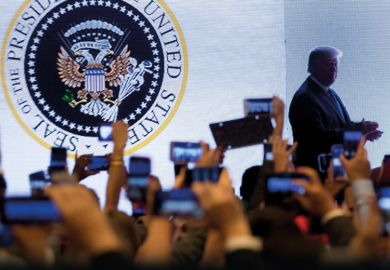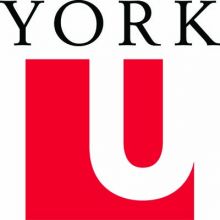The attack by Canadian Conservative party leader Andrew Scheer on university professors, while not likely to be taken seriously by voters, suggests a long-term threat deserving greater attention, faculty leaders have warned.
The critique took the form of Scheer campaign posters on the York University campus in Toronto promoting his candidacy with the slogan: “Because you can only hear the same left-wing talking points from your professors so many times.”
Mr Scheer has said that the posters were meant to be humorous and did not indicate any intent – if he becomes prime minister after the 21 October election – to attempt to dictate faculty appointments.
Leaders of Canadian faculty said they recognised the posters as an attempt to excite a relatively small audience of conservative voters. But they noted Mr Scheer also has a track record of promoting US-style campus “free speech” policies aimed at forcing institutions to host speakers known more for provocation and threats of violence than reasoned debate and exchange.
“I don’t think it was a joke,” said David Robinson, executive director of the Canadian Association of University Teachers. “It fits into their very stereotypical and frankly untrue vision of universities and colleges as somehow these indoctrination centres that are intolerant of conservative views.”
Mr Scheer has largely followed the lead of US president Donald Trump – who has signed an executive order on campus free speech – using the suggestion of a free speech crisis on university campuses as a politically potent issue to help him win the Conservative Party leadership in May 2017. The premier of Ontario, Doug Ford, later introduced a law tying university funding to compliance with free speech policies.
The tactics are “straight from the Republican playbook” in the US, said James L. Turk, a predecessor of Mr Robinson at CAUT and now a visiting scholar and director of the Centre for Free Expression at Ryerson University.
Professor Turk said he was confident that Canadians ultimately would be less receptive to such rhetoric. “I'm always on the lookout for the least sign that this way of thinking is growing in Canada,” he said. “But I really think that there's not much indication this is going very far.”
Mr Robinson was less definitive, describing himself as caught between a desire “to ignore this kind of nonsense” and a recognition that political attempts to dictate debate on university campuses can be “very very dangerous”.
But more substantive, at least for the moment, Mr Robinson said, is the very real concern among universities that a Conservative victory next month could slow federal investment in their research budgets.
And, while provincial governments set overall budgets and tuition rates at universities, they stand to be affected by Mr Scheer’s proposal that the federal government encourage private savings accounts for education. His plan, announced this week, would boost the federal contribution to Registered Education Savings Plans from 20 per cent to 30 per cent for every dollar invested, up to C$2,500 (£1,500) a year.
While that may seem helpful to students, Mr Robinson said, the RESP programme is largely used by people in higher-income brackets. A greater reliance on such accounts, especially if it helps supplant Canada’s traditional emphasis on low rates of tuition fees, could drive up student debt rates, he said.
Register to continue
Why register?
- Registration is free and only takes a moment
- Once registered, you can read 3 articles a month
- Sign up for our newsletter
Subscribe
Or subscribe for unlimited access to:
- Unlimited access to news, views, insights & reviews
- Digital editions
- Digital access to THE’s university and college rankings analysis
Already registered or a current subscriber? Login











